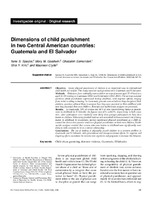Mostrar el registro sencillo del ítem
Dimensions of child punishment in two Central American countries: Guatemala and El Salvador
| dc.contributor.author | Speizer, Ilene S | es_ES |
| dc.contributor.author | Goodwin, Mary M | es_ES |
| dc.contributor.author | Samandari, Ghazaleh | es_ES |
| dc.contributor.author | Kim, Shin Y | es_ES |
| dc.contributor.author | Clyde, Maureen | es_ES |
| dc.date.accessioned | 2015 | |
| dc.date.available | 2015 | |
| dc.date.issued | 2008 | es_ES |
| dc.identifier.citation | Speizer, Ilene S,Goodwin, Mary M,Samandari, Ghazaleh,Kim, Shin Y,Clyde, Maureen (2008) Dimensions of child punishment in two Central American countries: Guatemala and El Salvador. Rev Panam Salud Publica;23(4) 247-256,abr. 2008. Retrieved from http://www.scielosp.org/scielo.php?script=sci_arttext&pid=S1020-49892008000400004 | en_US |
| dc.identifier.uri | http://www.scielosp.org/scielo.php?script=sci_arttext&pid=S1020-49892008000400004 | es_ES |
| dc.identifier.uri | https://iris.paho.org/handle/10665.2/7714 | |
| dc.format.extent | gra | es_ES |
| dc.format.extent | tab | es_ES |
| dc.relation.ispartofseries | Rev Panam Salud Publica;23(4),abr. 2008 | es_ES |
| dc.subject | Child Abuse | es_ES |
| dc.subject | Parenting | es_ES |
| dc.subject | Domestic Violence | es_ES |
| dc.subject | Guatemala | es_ES |
| dc.subject | El Salvador | es_ES |
| dc.subject | Maltrato a los Niños | es_ES |
| dc.subject | Patria potestad | es_ES |
| dc.subject | Violencia Doméstica | es_ES |
| dc.subject | Guatemala | es_ES |
| dc.subject | El Salvador | es_ES |
| dc.subject | Maus-Tratos Infantis | es_ES |
| dc.subject | Poder Familiar | es_ES |
| dc.subject | Punição | pt_BR |
| dc.subject | El Salvador | es_ES |
| dc.subject | Guatemala | es_ES |
| dc.title | Dimensions of child punishment in two Central American countries: Guatemala and El Salvador | en_US |
| dc.type | Journal articles | en_US |
| dc.rights.holder | Pan American Health Organization | en_US |
| dc.description.notes | OBJECTIVE: Severe physical punishment of children is an important issue in international child health and welfare. This study examines such punishment in Guatemala and El Salvador. METHODS: Data came from nationally representative surveys of women aged 15-49 and men aged 15-59 residing in Guatemala (2002) and El Salvador (2002-2003). The surveys included questions about punishment experienced during childhood, with response options ranging from verbal scolding to beating. In Guatemala, parents were asked how they disciplined their children; questions allowed them to compare how they were punished in their childhood with how they punished their own children. Bivariate and multivariate analyses are presented. RESULTS: In Guatemala, 35 percent of women and 46 percent of men reported being beaten as punishment in childhood; in El Salvador, the figures were 42 percent and 62 percent, respectively. In both countries, older participants were relatively more likely than younger participants to have been beaten as children. Witnessing familial violence was associated with an increased risk of being beaten in childhood. In Guatemala, having experienced physical punishment as a child increased the chance that parents would use physical punishment on their own children. Multivariate analyses revealed that women who were beaten in childhood were significantly more likely in both countries to be in a violent relationship. CONCLUSIONS: The use of beating to physically punish children is a common problem in Guatemala and El Salvador, with generational and intergenerational effects. Its negative and lingering effects necessitate the introduction of policies and programs to decrease this behavior.(AU) | en_US |
| dc.description.notes | OBJETIVOS: El castigo físico severo de niños es un tema importante de la salud y el bienestar infantil en el mundo. En el presente estudio se analiza este tipo de castigo en Guatemala y El Salvador. MÉTODOS: Se tomaron los datos de encuestas representativas nacionales realizadas a mujeres de 14 a 59 años y hombres de 15 a 59 años que residían en Guatemala (2002) y El Salvador (2002-2003). Las encuestas contenían preguntas sobre los castigos que sufrieron en su niñez, con posibilidades de respuesta que iban desde regaños verbales hasta golpizas. En Guatemala se preguntó a los padres cómo disciplinaban a sus hijos; las preguntas les permitían comparar cómo ellos eran castigados en su niñez y cómo ellos castigaban a sus hijos. Se presentan los resultados de los análisis bifactorial y multifactorial. RESULTADOS: En Guatemala, 35 por ciento de las mujeres y 46 por ciento de los hombres informaron haber sido golpeados como castigo durante su niñez; en El Salvador, las cifras fueron 42 por ciento y 62 por ciento, respectivamente. En ambos países, los encuestados más viejos tenían una mayor probabilidad de haber sido golpeados en su niñez que los encuestados más jóvenes. Haber presenciado violencia familiar se asoció con un incremento en el riesgo de recibir golpizas durante la niñez. En Guatemala, haber recibido castigos físicos durante la niñez aumentó la probabilidad de que como padres aplicaran castigos físicos a sus hijos. El análisis multifactorial reveló que las mujeres de ambos países golpeadas durante su niñez tenían significativamente más probabilidades de encontrarse en una relación violenta. CONCLUSIONES: El uso de golpes para castigar físicamente a niños es un problema frecuente en Guatemala y El Salvador, con efectos generacionales e intergeneracionales. Sus efectos prolongados y negativos requieren de la aplicación de políticas y programas que permitan reducir este comportamiento.(AU) | es_ES |
Ficheros en el ítem
Este ítem aparece en la(s) siguiente(s) colección(ones)
-
Pan American Journal of Public Health
Revista Panamericana de Salud Pública



